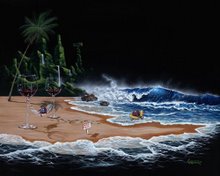
Unconstitutional and Illegal Federal Laws
Tuesday, June 12th:

Why do the courts refuse to admit certain arguments and cites of the
The fact is, we are not in Common Law under the Constitution – for that matter, we are not in Equity under the Constitution – we are under Maritime Law* (the Law of International Commerce-Law Merchant, Admiralty Law, Military Law, and Prison or Warden Law).
*Remember last weeks posting when I explained about the
Admiralty Law covers all controversies arising out of acts done upon or relating to the sea and questions of Prize. PRIZE is that law dealing with war, and the spoils of war – such as capture of ships, goods and materials, property – both real and personal.
Admiralty Law put another way, is the command enforcement necessary to maintain the good order and discipline on a ship, especially as a ship operated in the mid-1700’s. back then, the availability of crewmembers was a problem in the middle of the ocean. Therefore the enforcement of ship law had more to do with getting wayward crewmembers back into a state of obedience and usefulness, rather than as the imposition of lawful punishments – the latter being the purpose of law enforcement on the land.
Maritime Law is the system of law that relates particularly commerce and navigation. Because of this fact you will see that you don’t have to be on a ship in the middle of the sea to be under Admiralty Jurisdiction. This jurisdiction can attach merely because the subject matter falls within the scope of Maritime law – and, bills, notes and cheques and credits are within the scope of Maritime Law.
Admiralty Law came into existence due to the harsh realities and expedient measures required to survive at sea. It has very extensive jurisdiction of maritime cases, both civil and criminal. It contains a harsh set of rules and procedures where there is no right to trial by jury, no right to privacy, etc. In other words there are no rights under this jurisdiction – only privileges granted by the Captain of the maritime voyage.
As an example, under this jurisdiction, there is no such thing as a right NOT to be compelled to testify against oneself in a criminal case – the Captain can; however, if he is of a mind to, grant you the privilege to do so. There is no such thing as the right to operate your own business – only a privilege allowed as long as you perform according to the captain’s rules and regulations.
In gathering evidence and facts to prove that we are under Admiralty Law, it is necessary to look back in history, to a time just before our revolutionary war, when the colonies were seething and threatening revolt from the English King – when we had the Common Law of the Colonies. Agents of the King came over to collect their taxes. They did not use Common Law on the colonists; instead they applied Admiralty Law, arresting individuals, holding Star Chamber proceedings and denied the colonists their common rights as Englishmen.
Taxation without representation did play a part in the revolution, but it was the denial of their Common Law rights by putting the colonists under Admiralty Law that pushed the colonists over the edge. The King’s agents deprived the colonists of jury trials by putting them on ships and transporting them to ports in the
What exactly is the COMMON LAW? Common Law came from the Anglo-Saxon Common Law in England which existed, controlled and ruled England previous to the reign of William the Conqueror [1066], when the Normans conquered Anglo-Saxon England.
Where exactly did Anglo-Saxon Common Law come from? It did not come from Christianity’s introduction to
Thus, the English people had this pure and simple Common Law of personal and property rights, but there existed along side of it, even back then, the law of commerce, which is the Maritime Law. The earliest known recorded knowledge we have of Maritime Law is in the Isle of Rhodes, 900 B.C. then there is the Laws of Oleron, laws of the
All of the Saxons where subjugated by William the Conqueror to his rule except
The primary reason for the resistance on the part of the merchants of
In 1215, at
The primary objective and content of the Magna Charta was the prohibition of the use of Summary jurisdiction [the Roman or Admiralty Law] as a means of unauthorized taxation and seizure of property without due process of Law or just compensation. The colonists were, on the whole, very well schooled in the Common Law and were quite aware of the wrongs that King and Parliament were committing against them. This eventually forced them to rebel.
The Common Law that we had in our land is parallel to another ancient law. You will find that when our Founding Fathers set up the declaratory trust, known to us as the Declaration of "
It was generally conceded, by the framers of the Constitution, that the people had the right to bear arms, but they also knew that if we ever were placed or allowed ourselves to be brought under Maritime Admiralty Law concerning our persons and property, we would have dire need of a guarantee for our rights -- thus, the ten amendments were added to the Constitution, and that became the substantive part of the Constitution. Article III, Section 2, of the Constitution defines the Maritime Admiralty jurisdiction.
How have we been tricked out of our Common Law rights; and, into the Admiralty courts? How has equity as well as Admiralty been corrupted? How has the Federal Government made it almost impossible for us to receive our constitutional rights -- our substantive rights in the Constitution?
To learn the answers, and to understand the Constitution, we must know and understand the Declaration of Independence and those 56 men who signed it, and pledged their lives, liberty, family, property, and their honor to this sacred trust. All of these men were very knowledgeable and learned in the Common Law -- they knew the law because they studied the law, they may not have had a high school education (many of them). But they could read, and they read and studied law. They were men of the age or reason and they knew and they understood. They knew exactly what the king was doing. They knew the law.
As you can see, knowledge is a very important thing. James Madison wrote years ago: "Knowledge will forever govern ignorance, and a people who mean to be their own governors must arm themselves with the power which knowledge gives."
There is a chronological sequence of events that placed us where we are today. I can almost guarantee that you will reject, or want to reject, parts of what you are about to see, read and hear in the coming weeks. There is a theory known as the Theory of Cognitive Dissonance (TCD) that holds that the mind involuntarily rejects information not in line with previous thoughts and/or actions. Prepare yourselves; the coming lessons may be entirely different from anything you may have believed to be true. If you are unaware, you are unaware of being unaware!
Next week, Tuesday, June 19th: I will continue with understanding Common Law.
“Abouna” Gregori
















|